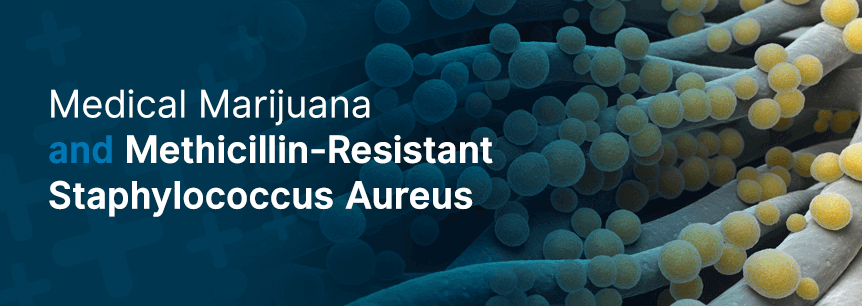
If you frequently suffer from staphylococcus (staph) infections, you know how painful and potentially dangerous they can be. Methicillin-resistant Staphylococcus aureus (MRSA), in particular, can be challenging to treat because it’s resistant to some antibiotics. Medical marijuana offers hope to individuals who have MRSA or who experience frequent MRSA infections.
Researchers have found that the major cannabinoids in the marijuana plant effectively fight MRSA. Medical cannabis is also known to reduce pain and inflammation, which can help patients with MRSA cope with their symptoms. Keep reading to learn more about medical marijuana for methicillin-resistant Staphylococcus aureus, the symptoms of MRSA and how to start cannabis treatment for MRSA today.
Marijuana contains antibacterial cannabinoids. Cannabinoids are the chemicals found naturally in the marijuana plant. There are dozens of known cannabinoids in the cannabis plant. Many people have heard of the cannabinoids tetrahydrocannabinol (THC) and cannabidiol (CBD). According to a study published in the Journal of Natural Products, the following five cannabinoids have shown great strength in fighting a variety of MRSA strains:
The researchers investigated the cannabinoids’ antibacterial profile. All of the compounds in the study showed potent antibacterial activity and were exceptional against some of the toughest MRSA strains, including the multidrug-resistant strain SA-1199B. This strain has a high resistance to certain fluoroquinolones — a class of antibiotics used to treat or prevent bacterial infections. The researchers also noted the potency of cannabinoids against the MRSA strains EMRSA-15 and EMRSA-16. Both of these strains were prevalent in U.K. hospitals.
The study revealed that certain resistance mechanisms could not attach to cannabinoids. This means that cannabis-based antibiotics may prove to be effective forms of MRSA treatment, unlike traditional antibiotics. It seems that the compounds in the cannabis plant have evolved to defend against bacterial cells.
Nevertheless, the method by which the cannabinoids kill MRSA is still a mystery. Further study is needed to produce marijuana-based antibiotics for MRSA treatment. In the meantime, patients can speak to a certified doctor about using medical marijuana to treat a range of MRSA symptoms.
Marijuana has been used to treat a wide range of medical conditions for thousands of years. Studies have shown that marijuana has countless medicinal benefits. Based on current knowledge, medical cannabis could be used to treat the following symptoms:
Inflammation is your body’s response to an injury or bacteria, such as MRSA. When inflammation occurs in your body, different immune cells release various substances, called inflammatory mediators. One of these chemicals is the hormone histamine. These substances cause small blood vessels in the tissue surrounding the site of injury or bacterial invasion to dilate. This allows more blood to reach the injury site, which in turn allows more immune system cells to be carried to the injured tissue and start the healing process. The immune system cells also cause more fluid to enter the inflamed tissue, which causes swelling.
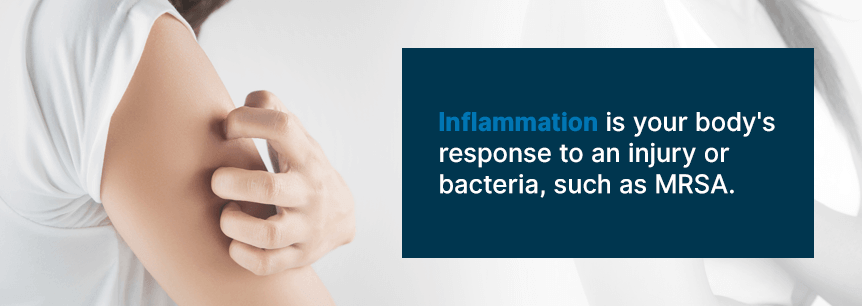
Inflammation is part of the natural healing process, but it’s also painful. If you have MRSA, you know what inflammation feels like. Sometimes the body overproduces substances during the inflammatory response and makes inflammation and swelling worse. Marijuana can help keep MRSA inflammation under control and reduce painful swelling.
Consider one review published in the journal Future Medicinal Chemistry. In the article, scientists review multiple cannabis studies and conclude that cannabinoids suppress the inflammatory response. As a result, cannabinoids weaken disease symptoms. Cannabinoids work by activating cannabinoid receptors located throughout the body as part of the body’s natural endocannabinoid system.
Due to swelling and inflammation, MRSA can cause great discomfort. Marijuana can help a patient cope with pain by blocking pain messages sent to the brain. Many studies support marijuana as a pain reliever, and doctors around the country recommend marijuana for pain. For example, a study published in the Canadian Medical Association Journal concluded that a single inhalation of 25 mg of THC smoked three times a day for five days reduced the intensity of pain, improved sleep and was tolerated well by study participants.
Patients suffering from severe MRSA might also experience headaches. Depending on their condition and the cannabis laws in their state, they might consider including marijuana in their treatment to relieve inflammation, pain and accompanying headaches. Marijuana can lessen the pain of MRSA-related headaches by reducing inflammation, relaxing tense muscles and decreasing pain signals. For example, one study found that migraine headache frequency decreased with medical marijuana use for adults who frequently experience migraines.
The first step to obtaining medical cannabis for MRSA is to research the laws in your state. Most states require you to have a qualifying condition to get medical marijuana. In some states, like California, for example, any condition which may significantly affect your ability to carry out major life activities may qualify. Patients who are vulnerable to severe MRSA infections may have a separate qualifying condition which could also benefit from medical marijuana.
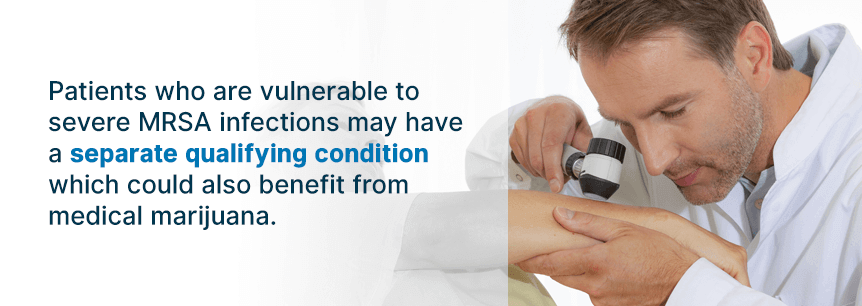
Once you become familiar with your state marijuana laws, search for a certified doctor to help you through the next steps.
How you take marijuana mostly depends on your condition and preference. You’ll want to discuss the options with your doctor first. With that said, here are a few common consumption methods to consider:
Many cannabis strains are available that reduce symptoms of MRSA like pain and inflammation. Many strains cause an overall sense of peace and relaxation to help you feel better while your body heals. Here are a few options to give you an idea of what to expect:
Like any medication, medical marijuana may cause certain side effects for some patients. A lot depends on how much you use, your tolerance to marijuana and your health condition. Your doctor will consider your current health condition and lifestyle to recommend the best strain or product for you.
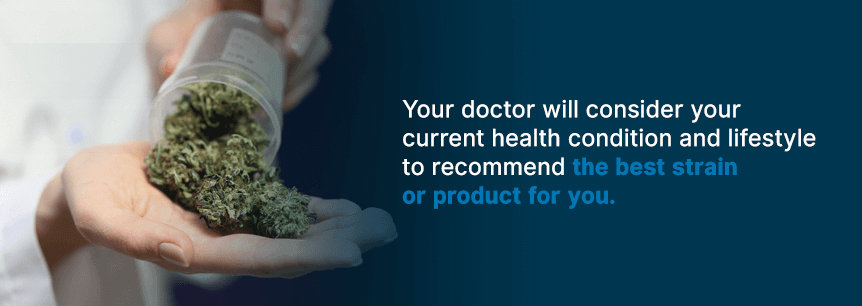
If you wish to avoid the psychoactive effects of THC, speak with your doctor about obtaining a product that is high in CBD instead. In general, here are some side effects you may experience after taking marijuana:
Researchers, doctors and scientists have high hopes for cannabis as a treatment for MRSA and other conditions that affect the skin. The medical community has long known of the anti-inflammatory, antimicrobial and anti-itch properties of cannabis, but regulations have historically prevented extensive research. For example, one study of patients with atopic dermatitis found that endocannabinoid cream improved the severity of itch and loss of sleep for the majority of study participants. More clinical data is needed to develop cannabis-based medicines for MRSA.
Now that you’ve explored cannabis as a treatment for MRSA, it’s time to learn more about what MRSA is and how it is traditionally treated.
Methicillin-resistant Staphylococcus aureus (MRSA) is a type of staph bacteria that is resistant to common antibiotics. Staph infections are caused by germs typically found on the skin or in the nose. These germs exist in healthy individuals as well and do not usually cause problems. Anyone can get MRSA, and infections range from mild to severe.
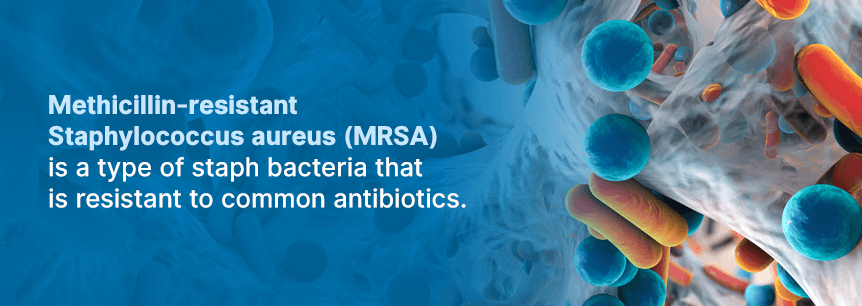
Most staph germs are spread through skin-to-skin contact. You might also get MRSA by touching objects such as towels, razors or athletic equipment that has MRSA on the surface. The risk of infection increases for individuals who spend a lot of time in crowded places like hospitals or long-term care facilities. Healthcare workers, athletes, students, military personnel, individuals with weakened immune systems and patients who receive inpatient care are particularly at risk.
Staphylococcus aureus, called staph, is very common. It’s a germ that one out of three people usually has without any illness. On the contrary, only two in 100 people carry MRSA. Most staph germs do not cause any issues for people who have it on their skin, but they can sometimes cause serious infections or lead to pneumonia or infection of the blood.
Although MRSA is still a concern, especially for those who spend a lot of time in hospitals, MRSA infections in healthcare are declining. For example, invasive MRSA infections that started in hospitals declined 54 percent between 2005 and 2011. Nevertheless, MRSA is not something to be ignored for the following reasons:
MRSA may appear as a red bump on the skin. The bump may look like a boil or spider bite. The infected bump may be:
You might also experience a fever with MRSA.
People with a severe MRSA infection may feel the effects of the germ getting into the bloodstream, hearts, lungs, or other parts of the body. They might experience the following symptoms:
A doctor should always treat MRSA. If the infection has not spread to other parts of the body, a doctor may only need to drain the infection for treatment. Do not try to drain the infection at home as this could make the infection worse, or you could spread the infection to others. Keep the sore covered with a clean bandage until you can see a doctor to drain it.
A doctor might also prescribe an antibiotic ointment and antibacterial soap to reduce the amount of staph on your skin and in your nose. They may also prescribe an antibiotic in pill form depending on the severity of the infection.

Antibiotics affect people differently, but common side effects include:
Perhaps the most problematic side effect is antibiotic resistance. If you take antibiotics without needing them, you may build resistance to antibiotics. Then, if you need an antibiotic in the future, the antibiotic will not work because you’ve developed a resistance.
Antibiotic resistance is an urgent threat to public health. About 30 percent of antibiotics are prescribed unnecessarily. Antibiotics should only be taken when the benefits outweigh the risks.
If you suffer from MRSA symptoms, you may be able to avoid developing antibiotic resistance and use medical marijuana for relief instead. However, because MRSA can become a serious condition if not treated properly, always speak with a certified doctor about the best MRSA treatment for you. Search for a qualified cannabis doctor or dispensary, and start the healing process today.
Find A Doctor Find A Dispensary